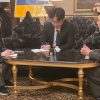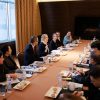Comment by Alyona Getmanchuk for “Kyiv Post“.
By Bermet Talant
On May 23, three men arrived at the White House with big news for U.S. President Donald J. Trump.
They were known as the “three amigos,” a trio of American officials tasked by Trump as a back channel in conducting U.S. foreign policy in Ukraine: Kurt Volker, the special envoy for Ukraine, Rick Perry, the energy secretary; and Gordon Sondland, the country’s ambassador to the European Union.
They had just returned from the inauguration of Ukrainian President Volodymyr Zelensky, whose landslide victory sparked a wave of optimism at home and abroad.
Zelensky left a favorable impression on the trio. They saw him as a leader truly committed to reforming his country and were excited to pass the news on to Trump. They hoped to convince the American president to meet with Zelensky and express Washington’s support for Ukraine.
To their disappointment, Trump didn’t want to listen. He said Ukraine was a disaster and corrupt and even called Ukrainians “terrible people.”
“They tried to take me down,” Trump fumed, according to Volker and Sondland’s October testimonies in the U. S. House of Representatives.
Trump instructed the trio to “talk to Rudy.” He meant Rudy Giuliani, his personal attorney and unofficial point person in Ukraine.
By that time, Giuliani was already deep into his covert scheme to discredit Washington’s former ambassador in Ukraine and dig up dirt on Trump’s political rivals, chiefly ex-Vice President Joseph Biden. Two aggrieved Ukrainian prosecutors were helping him.
The actions of Trump, Giuliani and the “three amigos” would soon be front and center in the impeachment inquiry opened into whether Trump abused his power to pursue personal political interest. Official testimony in the probe would lay bare an unsettling fact for Ukrainians: Trump appears to hate Ukraine.
Now Kyiv must figure out how to move forward with its critically important ties to Washington despite a president who views Ukraine as an enemy.
Origins
Trump’s view of Ukraine is “oversimplified and unfair,” and it could harm the country’s international image, says Alyona Getmanchuk, director of the Kyiv-based New Europe Center think tank.
“Yes, Ukraine still has problems with corruption, but it’s making a big effort to fight it,” she said.
The misunderstanding is hardly surprising.
According to the testimony from current and former officials, Trump did not listen to foreign policy experts and career diplomats, characteristically relying on his inner circle instead — mainly Giuliani, and before, on his former campaign manager Paul Manafort, a reviled figure in Ukraine for his work on behalf of Kremlin-backed ex-President Viktor Yanukovych.
Moreover, according to Lt. Col. Alexander Vindman, the White House’s top expert on Ukraine, Trump falsely believed another White House official, Kashyap “Kash” Patel, was the real Ukraine expert.
According to Politico, Patel misrepresented himself in order to provide the president with negative information about Ukraine, fueling Trump’s misconceptions.
At the heart of Trump’s aversion lies a conspiracy theory that Ukraine, not Russia, interfered in the 2016 U.S. presidential election, with the aim of helping his Democratic rival, Hillary Clinton.
Russian interference and concern about potential collusion between Trump and the Kremlin led to the special counsel investigation by former FBI director Robert Mueller.
Secret memos from that probe obtained by BuzzFeed News and released this week show that Manafort promoted the theory that Ukraine, not Russia, had hacked the Democratic National Committee’s servers in 2016.
Manafort was a knowledgeable — if not highly reliable — source on Ukrainian corruption. He made over $60 million from working as a political consultant and lobbyist for Yanukovych, ousted by the EuroMaidan Revolution in 2014 over his corruption and pro-Moscow views. Manafort was subsequently sentenced to 7.5 years in prison for bank and tax fraud in the U.S.
In October, the Washington Post reported that Guiliani consulted with Manafort several times through a prison lawyer about the secret ledger that showed off-the-books payments from Yanukovych’s party to Manafort.
That document forced Manafort to resign from the Trump campaign in 2016, but Giuliani has questioned its authenticity and claimed it was part of a Ukrainian effort to undermine Trump.
Trump raised these unfounded theories during the-infamous July 25 phone call with Zelensky and even asked his Ukrainian counterpart to find a supposedly missing Democratic server in Ukraine.
“The server, they say Ukraine has it… That whole nonsense ended with a very poor performance by a man named Robert Mueller… but they say a lot of it started with Ukraine,” Trump said, according to a memorandum reconstructing the call. The notion of the missing server is a conspiracy theory.
In 2018, the U. S. Department of Justice charged 12 Russian intelligence officers with cyberattacks on email accounts belonging to staff on Clinton’s campaign.
Giuliani, who joined Trump’s legal team in April to defend him in Mueller’s probe, was looking for evidence of Ukraine’s collusion with the Democrats. He found two resentful former Ukrainian prosecutors general — a position held by a series of questionable figures from 2016 to 2019.
The first, Viktor Shokin, claimed he was fired under pressure from then-Vice President Joe Biden, who wanted to block a corruption probe into Ukrainian company Burisma, where his son worked. He was half right: Biden had joined widespread calls for the ineffective Shokin to be fired, but there is no evidence his son had anything to do with it.
The second, Yuriy Lutsenko, held a grudge against then-U. S. Ambassador Yovanovitch, who had criticized his failure to reform the office, prosecute killings during the 2014 EuroMaidan Revolution and investigate money laundering by Yanukovych and his associates. He spread open falsehoods about the ambassador and later recanted them.
In the July 25 call, Trump also asked Zelensky to talk to Giuliani about the Bidens.
According to testimonies, Trump wanted a public statement from Zelensky pledging to investigate Burisma and Ukrainian interference in the 2016
U.S. elections in exchange for $391 million in military aid to Ukraine, which he froze shortly before the call, on July 18.
Worries
During the 2016 presidential campaign, Ukrainians had reason to worry about Trump. Candidate Trump had expressed admiration for Russian President Vladimir Putin. Unsurprisingly, many Ukrainians — including some politicians — feared he would put Moscow’s interests ahead of Kyiv’s.
On Nov. 9, 2016, as votes were being counted in the U.S., Yovanovitch gathered journalists in Kyiv and assured them that “no matter who the next commander-in-chief is… the United States will remain a strong partner of Ukraine.”
Still, three years later, Ukraine’s concerns remain.
Zelensky’s administration has a daunting to-do list: it must secure another package of aid from the International Monetary Fund, advance long-awaited reforms and hold another round of Donbas peace talks with Russia, France and Germany.
Zelensky’s preparations for those negotiations — specifically, pulling back troops at several flashpoints in the Donbas and agreeing to a peace formula that will grant the region self-governance within Ukraine — have sparked protest across Ukraine. His critics accuse him of capitulating to the Kremlin.
The Ukrainian government could seriously use U.S. support as it prepares for difficult negotiations with Putin. But both Republicans and Democrats are consumed with the impeachment probe.
“Kyiv wants full U.S. backing as it prepares for the possible Normandy summit, especially as Ukrainians see the U.S. as the only Western country that can serve as a counterbalance to Russia,” Steven Pifer, a former U.S. ambassador to Ukraine, wrote in his notes upon his recent visit to Kyiv on Nov. 4.
The Zelensky administration has opted to keep silent on the scandal in Washington, hoping to weather the political storm and not jeopardize bipartisan U.S. support.
Michael Bociurkiw, a global affairs analyst and former spokesperson for the OSCE Special Monitoring Mission in Ukraine, thinks silence isn’t the best strategy, saying Ukraine’s leadership has to be quick and aggressive in repairing Ukraine’s image before it threatens future aid and investment.
“The brilliant strategy would be to lobby for Zelensky’s invitation to address the U. S. Congress, both the Senate and the House,” he told the Kyiv Post.
“It would be a great opportunity for him to present Ukraine’s case and put forth that the country is working hard towards democracy, integration with the EU and fighting corruption.”
Analyst Getmanchuk echoes Bociurkiw’s idea to appeal to Congress.
She fears the only way to improve Trump’s skewed perception of Ukraine is to give in to his demands — “too high of a price to pay for the U.S. president’s support.”
“It seems that Trump is inclined to hear only those voices whose assessment coincides with his deeply rooted skepticism on Ukraine,” Getmanchuk told the Kyiv Post. “So we should start working with the Congress, American thought leaders and the business community. We should transform the enormous attention on Ukraine into an opportunity to tell the U.S. political and business elite a real story about Ukraine, not Giuliani’s story.”
That wasn’t the Zelensky administration’s initial plan. Before the White House unfroze military aid after a bipartisan outcry in the U.S., the Ukrainian government planned to give in to the U.S. president’s demands and announce it was reopening an investigation into Burisma on CNN.
To Pavlo Klimkin, Ukraine’s former foreign minister, that would have been a mistake. “From the very beginning, my point was, to be successful in D.C., we needed clear bipartisan consensus on Ukraine,” he told the Kyiv Post. “It’s crazy dangerous to play around with that.”
He advises the Ukrainian government to make a clear argument about the importance of U.S. military aid, be transparent and separate politics from legal issues.
“It’s the only way to keep a minimum level of credibility,” Klimkin said.
Kyiv Post chief editor Brian Bonner contributed to this story.







